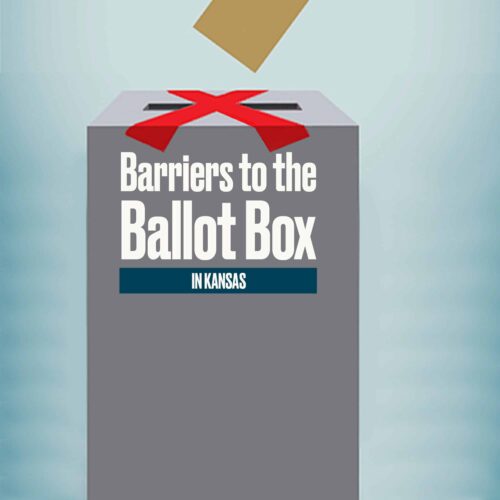Introduction
A law that disenfranchised more than 30,000 Kansans is no longer in effect but looms over this election.
Former Secretary of State Kris Kobach’s claims of widespread voter fraud led the Sunflower State to pass a law requiring Kansans to prove U.S. citizenship when registering to vote. Acceptable documents included a passport, birth certificate or certificate of naturalization.
Sign up for The Moment newsletter
Our CEO Susan Smith Richardson guides you through conversations and context on race and inequality.
The Secure and Fair Elections Act was signed into law in 2011. Kobach, a Republican, went on to push for stricter voter ID laws nationally. He led President Donald Trump’s now-disbanded election integrity commission. This year, 35 states have some form of voter ID law in effect.
Earlier this year, a federal appeals court found Kansas’s law is unconstitutional and violates the National Voter Registration Act. The state has appealed the decision to the U.S. Supreme Court.
“Kobach fundamentally shifted the way that elections are run in Kansas and discussed throughout the country,” Shannon Portillo, associate dean for academic affairs at the University of Kansas, said in an email. “He has left a lasting legacy, particularly around an unfounded fear of voter fraud.”
The Kansas law can intimidate immigrant populations, said Michael Smith, a political science professor at Emporia State University. More than a quarter of the population of Emporia, southwest of Topeka, is Latino. “I’ve heard a lot of anecdotal stories about people who just don’t want to poke the bear, so they don’t register and vote even though they are American citizens who have that right,” Smith said.
Despite the legacy of Kobach’s law, advocates point to several recent gains: a new ballot tracking system, funds from the Coronavirus Aid, Relief and Economic Security Act used to provide counties with personal protective equipment and cleaning supplies, and an expanded timeline for the state to accept ballots. Those postmarked by Election Day will be counted as long as they arrive no later than three days afterward.
Election officials also may process returned ballots as they receive them, putting Kansas in a better position to get a count sooner, said Cillie King, co-president of the League of Women Voters of Kansas.
Here are some of the most significant barriers Kansans face when voting in November:
Voter registration
Kansans must register to vote no later than 21 days in advance of an election. The deadline used to be two weeks beforehand, but the state lengthened it in 2012 during Kobach’s tenure as secretary of state.
“Most sane, normal people don’t pay attention to this stuff until the last minute, and then it’s too late to register,” said Davis Hammet, president of Loud Light, a youth-focused civic engagement organization. “This has a disproportionate impact on young people.”
Kansas also does not have automatic voter registration, which could have helped to alleviate a last-minute surge of voter registrations and updates, Hammet said.
Nineteen states and the District of Columbia automatically register citizens to vote when they interact with the Department of Motor Vehicles, unless they decline, according to the National Conference of State Legislatures.
Kansas legislators have rejected same-day registration, which would permit qualified citizens to register and vote on Election Day. Similar laws have been enacted in 21 states and the District of Columbia. Kansas Republicans argue that it would increase costs for county election officials. But supporters charge that there is little administrative burden for a big potential increase in voter participation.
“Any time we can lessen the number of steps in voting, we increase access to the ballot box,” Portillo said.
Provisional ballots
Kansans are required to re-register to vote when they move to a different county within the state. If they don’t, they are permitted to vote with a provisional ballot, but it may not be counted.
Voters in this category made up roughly 50% of rejected provisional ballots in 2018, according to Hammet, who sued the secretary of state for access to provisional ballot data.
Those voters failed to update their registration by the 21-day deadline. They are among the 80% of rejected ballots that can be attributed to the voter registering after the deadline.
“We don’t know how many people are falling through the cracks,” Hammet said. “We don’t know how many people go in, are told, ‘You’re not on the voter roll,’ and just walk out.”
About 2.7% of all ballots Kansans cast in the November 2018 election were provisional, one of the highest rates in the country during that election, according to an analysis by KCUR.
Election experts are expecting even more voters to cast provisional ballots this year. That would include anyone who received a mail-in ballot, changes their mind and votes in person, given concerns about U.S. Postal Service delays.
Earlier this year, a Kansas Senate committee considered a bill that would have ensured voters whose names do not appear in the poll book but are otherwise eligible to vote would have their votes counted. The bill had widespread support but was opposed by Republican Secretary of State Scott Schwab. It died in committee in May.
Inconsistent regulations
Voter access varies by county, experts said. A patchwork of regulations and practices can confuse voters.
In Ellis County in western Kansas, ballots incorrectly listed a state Senate race as a U.S. Senate race. In response, county election officials suspended in-person voting for three days until corrected ballots were available. But the county risks voter suppression because it did not fully make up for the time early voting was suspended, said Nadine Johnson, executive director of the American Civil Liberties Union of Kansas.
Ellis County also mailed the incorrect ballots to nearly 4,000 voters. “They declined to correct the ballots that had already been sent out, so that’s a layer of additional confusion,” Johnson said.
The county did not try to contact voters because so many had received the misprinted ballots, County Clerk Donna Maskus told the Kansas Reflector.
Voters have been very understanding, Maskus said: “I feel real bad that the situation has happened, but we are dealing with it and moving forward.”
Kansas City, the state’s largest metro area, straddles the border with Missouri. But the states have wildly different voting laws. For instance, Missouri doesn’t have ballot drop boxes. Kansas does. Kansas has no-excuse absentee voting. The Missouri General Assembly passed an emergency provision permitting only those voters who fall into certain categories to request an absentee ballot.
“So folks watching the news in the Kansas City media market may be confused, for example, and not realize that early voters in Kansas do not need to have their votes notarized,” Smith said.
Larger counties, like Douglas, have increased the number of available advance voter locations and placed drop boxes throughout the county. But Wyandotte County, which has a higher proportion of voters of color, has more limited in-person advance voting options and fewer drop boxes proportionally, Portillo said.
“Similarly, when we see the closing of polling places in the state, they often take place in communities that are more likely to experience disenfranchisement,” Portillo said.
Read more in Money and Democracy
US Polling Places
The District of Columbia learned how to run an election in a pandemic
The primary election was a mess, but the voting process has since improved.
US Polling Places
South Carolina’s history of disenfranchisement looms over tight U.S. Senate race
A surge in absentee ballots prompts court battles over witness and signature requirements.


Join the conversation
Show Comments